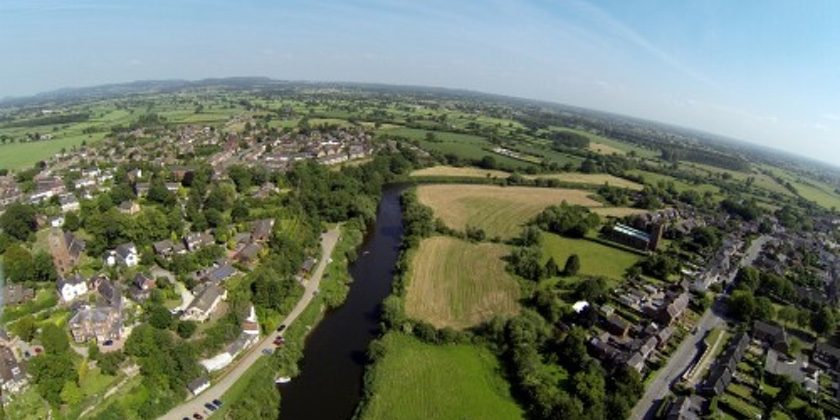“Wake up” call on phosphate issue with warning of “massive impact on the economy of Wales if it’s not resolved quickly”

Serious concerns have been raised as planning applications in Wrexham are said to be “standing still” due to targets to reduce phosphate pollution levels in Welsh rivers.
In January of last year, environmental regulator Natural Resources Wales (NRW) introduced phosphate control regulations to protect watercourses in Special Areas of Conservation (SACs) across the country.
The Welsh Government said phosphate pollution poses a “serious risk” to health and must be addressed.
However, developers have expressed frustration as the measures have led to their proposals being delayed.
It comes as local authorities are reported to be struggling to find ways to allow schemes to move forward whilst tackling any potential increase in phosphates.
Phosphates are naturally occurring minerals which can enter rivers via land management practices, sewerage and foul water, causing significant ecological damage.
Evidence published by NRW shows phosphorus breaches are widespread within Welsh SACs, including the River Dee, where target levels have not been met.
Both Wrexham and Flintshire Council have experienced delays in having their local development plans approved because of the tough new rules.
It has led the two authorities to create a draft strategy to address the issue of phosphates in the Dee catchment area, with the documents going before the Executive Board on Tuesday.
At this month’s media briefing, with just the usual two media attending (Wrexham.com and BBC), we probed the issue with Cllr David Kelly who gave a laymans overview from an agricultural point of view of the issue around build up of phosphates, he said “I do believe that local authorities have become the fall guys for addressing the phosphate problem, when development will be a contributor. But, with the right type of water treatment and mitigation at the source through even reedbeds and treatment plants and whatever, less and less of this phosphates has got the potential to enter the major water causes” highlighting Natural Resource Wales were ‘ in denial that agriculture needs to change’.
With talks of water treatment plants we enquired if there will be a short or long term solutions, the answer perhaps hinting at how much the Local Development Plan would be delayed event further. Chief Executive Ian Bancroft explained, “I think we’ve got to undertake this at all levels, short, medium, and long term.
“Cllr Kelly’s talked about the long term resolutions through water treatment and through farming, and that comes through legislation. So there’s an important advocacy role that we need to undertake in terms of getting across the criticality of reductions in phosphorus going into water courses, or it being dealt with in terms of treatment.
“At the moment, the requirements from Natural Resources Wales means that anytime we build, we have to look through the planning process at mitigating additional phosphorus that generally goes in through toilets and wastewater. So the short term work that we have to do is alongside any planning application, and be looking at is the mitigation place to reduce the impact of phosphorus going in to the water courses?.
“The short term work is how do you look at designing and building that mitigates at source phosphorus going into the water course.”
“The medium term work which is raising awareness and looking at solutions in relation to the Dee Valley, which is the purpose of the board.”
“The long term work is raising awareness of this, and engaging to make sure that it’s not just being tackled in terms of new build, it’s being tackled in relation to treatment.
“If we are just addressing it as local authorities, then actually, that’s going to make it very, very difficult to address it effectively, because it’s only a proportion of the way of stopping phosphorus and reducing phosphorus going into the water course.”
With the extra onus on local councils to help solve the problem, we asked if there was any new funding to help. Council Leader Mark Pritchard gave a quick “no”.
Carrying on, he then branded it a ‘mess’ adding, “if we’re not careful, every planning department in Wales is going to come to a standstill”.
Cllr Mark Pritchard said: “The Welsh Government and Natural Resource Wales have to resolve this because we can’t.
“They have to really roll their sleeves up and find a solution to this problem because we have planning applications in Wrexham standing still.
“It’s the same across Wales and it’s not good. If we’re not careful we’ll have serious issues with investments, developers and projects standing still, because we can’t mitigate the issue around phosphates through the planning process.
“It’s a serious issue, everybody’s aware of it and I think it needs to be resolved very quickly so we can all move on.”
“Developers are not going to wait around and wait for this issue to be resolved, they will spend the money in England and invest in England. It’s not good. I think that everybody needs to wake up to this very quickly, that it will have a massive impact on the economy of Wales if it’s not resolved quickly.”
Responding to Cllr Pritchard’s comments, a Welsh Government spokesperson said: “We are working with partners to tackle phosphate pollution, which poses a serious risk to the health and wellbeing of our future generations if left unchecked.
“While we prioritise building affordable housing at pace in Wales, the resilience of our river ecosystems and the benefits they provide – including top quality drinking and bathing water to benefit our communities, our businesses and our wildlife – must not be jeopardised.
“We are in a climate and nature emergency, and must make sure that what we do today doesn’t lead to unintended consequences that prove damaging to communities and future generations further down the line.
“We are committed to building 20,000 low carbon and affordable homes for rent over the next five years, and are working closely with our partners to deliver this ambitious target.”
Natural Resources Wales has been approached for comment.
Members of Wrexham Council’s executive board will discuss measures to address the risk of phosphate pollution at their next meeting on Tuesday (March 8, 2022).
Wrexham.com / Local Democracy Service
Spotted something? Got a story? Email [email protected]












